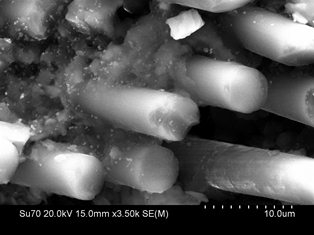Mar 11 2015
The Irish Centre for Composites Research (IComp) at the University of Limerick has been awarded €240,000 by the European Space Agency (ESA) for a new space materials research project, entitled “Demisable Bio-Composite Materials”. The 18 month project which commenced last month is led by Dr Walter Stanley, Lecturer in Mechanical, Aeronautical, and Biomedical Engineering at UL.

The project will develop a new bio-composite material for space applications within ESA’s Clean Space initiative. Developing new, green technologies as a means of complying with environmental legislation and making space activities more sustainable are key elements of the Clean Space Initiative. IComp’s Demisable Bio-Composite Materials research will help develop new materials for space applications to further reduce the environmental challenges associated with space exploration and move toward a life-cycle that is capable of being continued with minimum long-term effect on the environment.
The demisability - the ability of a material to disintegrate during an atmospheric re-entry - of the material is a key element of the research project. Carbon fibres when used in spacecraft could pose a risk upon atmospheric entry. Due to their intractability the fibres have limited demisability and spacecraft structural parts may survive the atmospheric entry (or re-entry) and reach the ground with an associated casualty risk. Environmentally compatible alternatives are being investigated and examined.
This is the first contract awarded by the European Space Agency to IComp, which is a Technology Centre funded by Enterprise Ireland.
“It is a great privilege to be awarded this exciting research contract by the ESA, and to contribute to ESA’s Clean Space initiative to support a sustainable space environment as well as a more sustainable space industry” commented Dr Walter Stanley.
“For IComp, this is great opportunity to expand our research efforts in the space sector and transfer knowledge of bio-composites into new and emerging technologies. We are delighted to be awarded this contract and hope to continue our research efforts in this area” says Dr Norah Patten, Communications and Outreach Manager at IComp.
About Clean Space: Clean Space has been introduced as a theme cutting across ESA’s Technology programme, with four principal branches. One of these branches is the development of new, green technologies. ‘Green’ means different things to different people, but the ESA has a solid definition: green technologies should allow for the reduction of energy consumed during the life cycle of a space mission; enable the use of resources in a more sustainable way; limit and control the use of harmful substances for human health and biodiversity; adopt a proactive approach towards environmental legislation and manage the residual waste and polluting substances resulting from space activities.